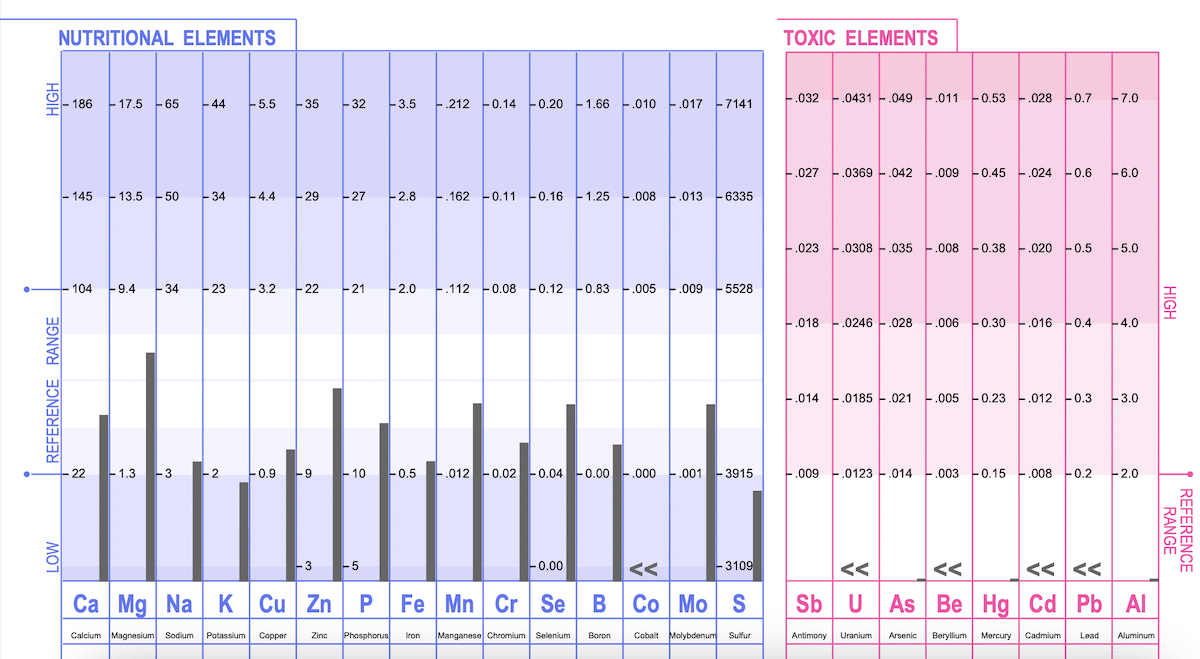20 Breakfast Ideas For Gestational Diabetes
It would not be fair to you if I just went straight into the Breakfast Ideas for Gestational Diabetes without covering some very important topics regarding pregnancy, gestational diabetes (GD), deficiencies, toxins, and special tips! So feel free to read along or jump to the 20 Breakfast Ideas for Gestational Diabetes here.
Jump to section:
- What is Gestational Diabetes?
- Why is Breakfast Important in Managing Gestational Diabetes?
- Target Blood Sugar Levels for Gestational Diabetes
- Gestational Diabetes Diet
- Tips for Busy Days
- Are your Nutrient and Mineral stores depleted?
- 20 Breakfast Ideas for Gestational Diabetes
- Final Thoughts
- EXPLORE MORE:
What is Gestational Diabetes
Gestational Diabetes (GD) is a type of diabetes that occurs during pregnancy. Essentially because the body cannot produce enough insulin to meet its increased needs. Insulin is a hormone that helps regulate blood sugar levels by allowing glucose to enter cells for energy. When insulin production is insufficient or ineffective, blood sugar levels can rise, leading to gestational diabetes.
Though GD usually resolves after childbirth, unmanaged GD can significantly affect both mother and baby.
Many women feel guilty when they are diagnosed with GD, especially when the struggles of managing the blood sugars, diet, and daily activities come into play. After you are done getting some breakfast ideas please read this post -> Is Gestational Diabetes my fault? <- This guide explores gestational diabetes, including its risk factors, management, and potential complications. Hugs!
Why is breakfast important in managing Gestational Diabetes?
Starting your day with building a blood sugar-friendly breakfast is crucial when managing gestational diabetes. Here’s why:
Blood Sugar Stability:
Breakfast plays a crucial role in blood sugar stabilization by breaking the overnight fast, which is why it’s called “break-fast.” During sleep, your body undergoes a natural fasting period, where it relies on stored energy (stored glucose/sugar) to keep vital functions running.
Upon waking, your body is in a state where cortisol, the stress hormone, is naturally elevating as part of the body’s awakening response. This rise in cortisol helps to boost energy levels to start the day, but if not balanced with food, it can lead to elevated blood sugar levels and stress on the body.
Sustained Energy:
That’s why it’s a great idea to fuel your body with a balanced meal in the morning, you’re providing the necessary nutrients to kick-start your metabolism, which keeps your energy levels stable throughout the day and prevents that need to “catch-up” feeling later in the day.
Enhanced Cognitive Function:
A good breakfast fuels your brain, improving concentration, memory, recall, and overall cognitive function. Good bye brain fog!
BTW Did you know that carbs are our brains’ preferred source of energy (fuel!)
Better Mood:
A healthy breakfast can stabilize blood sugar levels, reducing irritability and promoting the production of neurotransmitters like serotonin, which are responsible for regulating mood and promoting feelings of well-being.
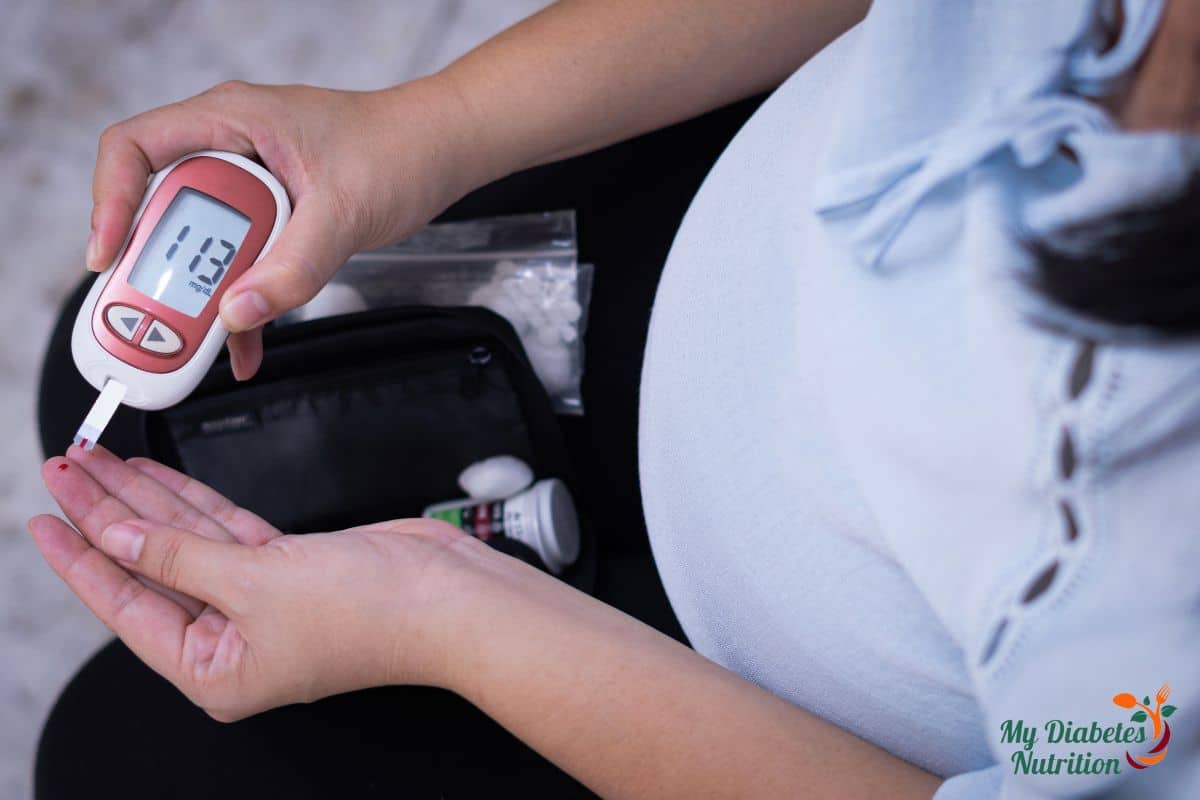
Target Blood Sugar Levels for Gestational Diabetes
Monitoring your blood glucose levels is key to understanding how specific foods impact your blood sugar.
We recommend regular monitoring of fasting and post-meal blood sugar levels.
This can be done using a glucometer, which involves a simple finger prick, or a continuous glucose monitor (CGM), an implanted device that provides real-time readings all day long.
The target blood sugar levels during pregnancy are stricter than those for non-pregnant individuals due to the risks associated with high blood glucose levels, such as macrosomia (a larger-than-normal newborn), and brain and heart defects (just to mention a few).. Maintaining these levels is crucial for a healthy pregnancy outcome.
Standard target blood sugar levels for gestational diabetes include:
(by the American Diabetes Association)
- Fasting: <95 mg/dL
- 1-hour post-meal: <140 mg/dL
- 2-hour post-meal: <120 mg/dL
Aim for a hemoglobin A1c (three-month average of blood sugar levels) of less than six percent during pregnancy. Your doctor will provide personalized guidance on your ideal blood sugar and A1c levels based on your medical history.
Gestational Diabetes Diet
The American Diabetes Association suggests that pregnant women consume at least 175 grams of carbohydrates, 71 grams of protein, and 28 grams of fiber per day.
In my practice, we aim for about 90 grams of protein daily, or more, though this can vary based on individual needs, physical activity, stress, and other factors.
We also practice dividing and pairing carbohydrate, protein and healthy fats intake across three meals and at least two snacks daily. This approach helps distribute our food evenly and balanced, minimizing post-meal blood sugar spikes and aiding in insulin management. (See Image above for an example).
For a list of Foods & Serving sizes you can eat with Gestational Diabetes < Click here – – The subject deserved its own blog post 😉
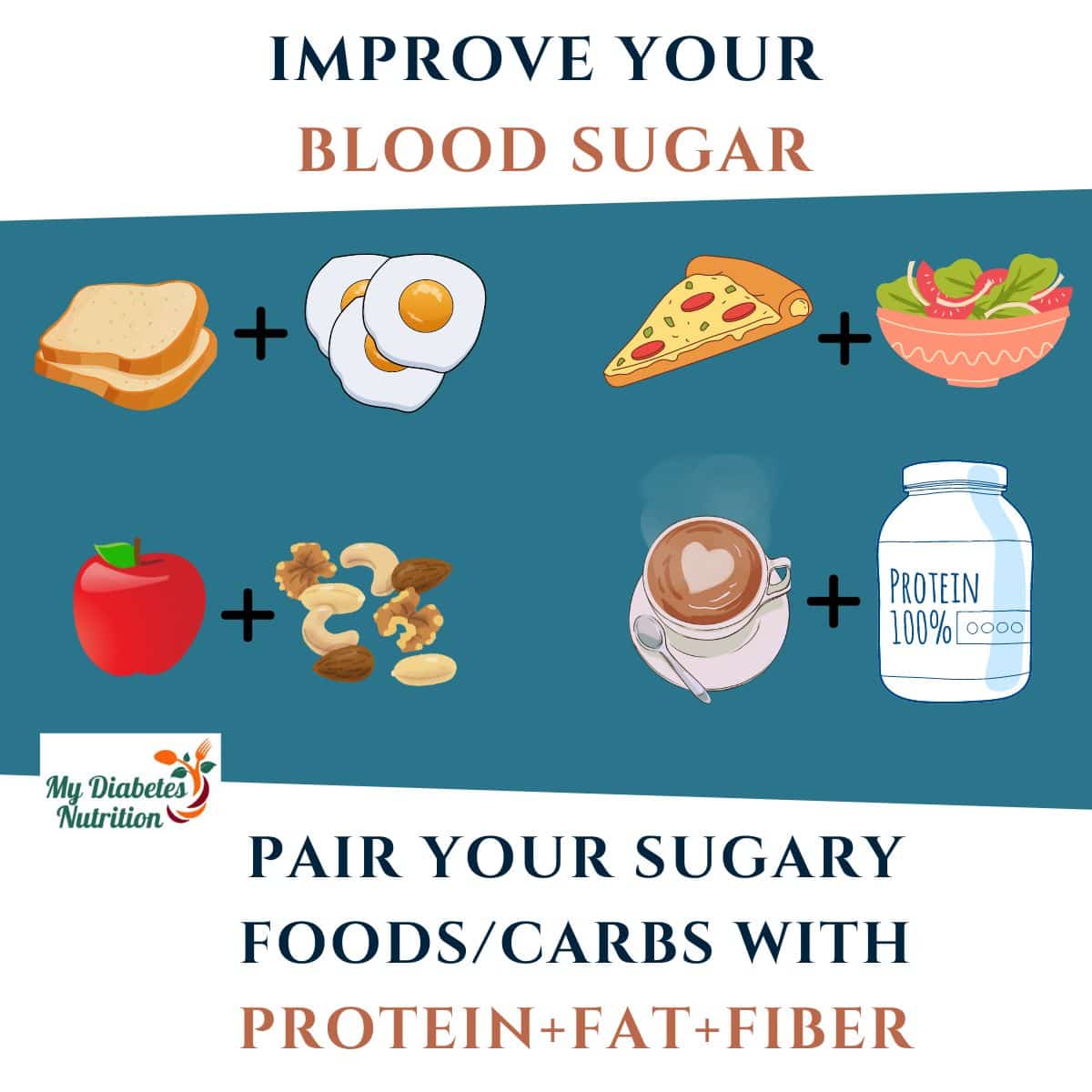
Incorporate Key Nutrients
Complex Carbohydrates: Opt for slow-releasing carbs naturally full of fiber like whole grains, oats, quinoa, and sweet potatoes to avoid rapid blood sugar spikes.
Fiber: Include fiber-rich foods, such as whole-grain bread, avocados, spinach, and berries, to slower glucose absorption.
Protein: Add protein sources like eggs, Greek yogurt, tofu, or lean meats to maintain blood sugar stability by slowing down carbohydrate absorption and promote satiety.
Healthy Fats: Include fats from sources like cheese, avocados, nuts, and seeds to help stabilize blood sugar and keep you full.
When building meals, especially breakfast, consider your preferences to ensure satisfaction and prevent overeating. Balancing what you enjoy with what your body needs can improve your relationship with food.
Book a Session with a
Nutrition & Diabetes Specialist
Get your personalized plan
That suits YOUR needs during pregnancy and BEYOND.
Sign Up TodayTips for Busy Days… everyday
We all have those mornings when time is tight, and skipping breakfast or grabbing something unsatisfying is tempting. If you’re short on time and energy, here are tips to help you prepare a balanced breakfast, even on the busiest days:
Honor Pregnancy Symptoms
Cravings and aversions are common during pregnancy. To manage cravings, pair your desired food with other nutrients to create a balanced meal.
- If you crave something sweet, try combining strawberries drizzled with dark chocolate with a handful of nuts.
For food aversions, incorporate the disliked food into recipes where its flavor is masked, or swap it with another food that provides similar nutrients.
- Example, replace meat like chicken or beef with plant-based proteins like beans or lentils.
Avoid Certain Foods
Avoid foods with added sugars, refined carbs, or sweetened beverages, such as candy, French fries, sweetened yogurts, soda, and donuts. These foods are nutrient-poor and can make blood sugar management difficult. Stick to nutrient-rich breakfast options instead. See the meal ideas provided at the end of this post.
Eat Your Protein First
Research shows that eating protein and fat first, followed by carbs, can improve post-meal blood sugar levels.
Aim for 20 – 30 grams of protein per meal.
And equally important, aim to eat within 60 -90 minutes after waking up. (break the fast, bring down cortisol, and boost energy!)
Lower Stress
Stress comes in many forms, and our bodies often can’t tell the difference between them. Whether it’s the physical strain of pregnancy, breastfeeding, undereating, or overexercising, the environmental stress of living in a bustling city with poor air quality, or the mental and emotional challenges of motherhood, it all adds up. As women—and especially as moms—we carry so much on our shoulders.
While it’s impossible to eliminate all stress, we can take steps to manage it more effectively by setting boundaries and supporting our “stress bucket.”
Do: Focus on the essential tasks that only you can handle—like breastfeeding, going to work, or taking the kids to daycare.
Delegate: Consider outsourcing some of your responsibilities. Try a meal delivery service a few times a month, or hire someone to clean your house. Make a list of everything you do and see which tasks your partner or family members can take on.
Delete: Set boundaries to protect your well-being. If the news, social media, or certain people and events add to your stress, limit your exposure to them.
Add: Incorporate activities that energize you. Play on the floor with your kids, practice breathwork, or do some grounding by taking your shoes off and feeling the earth. Take a solo walk, even if it’s just for five minutes, or have a two-minute dance party. Try using an acupressure mat to release tension.
Move your body
Don’t forget to move your body more – walking, swimming, dancing for at least 30 minutes a day. This helps boost your muscles’ ability to absorb extra glucose hanging out in the blood. It also stimulates blood flow and fresh oxygen for you and baby 🙂
By making these small, mindful adjustments, you can better manage the stress in your life and create more space for joy and balance.
Prep in Advance
Prepare breakfast items over the weekend, days off or the night before, like chopping veggies and fruits or mixing chia seed pudding, so you can assemble breakfast quickly in the morning.
You can also batch-cook items like scrambled tofu or crustless quiche for easy reheating.
Stay Hydrated
Staying hydrated is crucial during pregnancy. The American College of Obstetricians and Gynecologists recommends drinking 8 to 12 cups of water daily to support digestion and nutrient circulation. If plain water is hard to drink, try adding a slice of lemon or lime for flavor without spiking blood sugar.
I also highly encourage most of my pregnant and non-pergnant clients to start and continue the day with a refreshing mineral drink that contains sodium, potassium, and vitamin C. This offers numerous benefits for hydration, blood sugar regulation, blood pressure, digestion and so much more!
Some people require more minerals than others, depending on their
deficiencies, toxic buildup, lifestyle, and other factors.
To learn more about your specific need you can read more about HTMA (Hair Tissue Mineral Assessment) here
Food and Mineral Guide <- includes recipes, food serving sizes, and more!
Are your Nutrient and Mineral stores depleted?
To ensure you’re meeting your nutrient needs, consider a Hair Tissue Mineral Assessment (HTMA). This test provides a deeper look at your mineral levels, helping to identify and address deficiencies that are crucial before, during, and after pregnancy.
Minerals are our bodys spark plugs, they work SO hard to keep us going but if we are not replenishing them often then we will end up with a laundry list of issues and symptoms. I offer this test to all my clients to ensure they’re fully supported nutritionally.
Final thoughts for a healthy breakfast ideas in pregnancy with gestational diabetes:
Starting your day with a blood sugar-friendly breakfast is essential for managing gestational diabetes, helping to maintain stable levels and giving you the energy you need. These tips provide practical solutions for busy mornings while prioritizing your health. Pregnancy and postpartum can be once of the most beautiful and memorable times of our lives as women but it can also be incredibly stressful and draining on the body. You do not have to navigate this time alone.
For personalized guidance on managing gestational diabetes and beyond, consider 1:1 nutrition coaching, which may be covered by your health insurance.
Book a free call to learn more.
By understanding the basics of gestational diabetes, creating the best breakfast for gestational diabetes, and using these tips, you’ll be well-prepared to enjoy healthy breakfasts and stable blood sugar levels!
Gestational Diabetes Breakfast:
The following breakfast ideas and recipes are designed to help you better manage blood sugar levels throughout your pregnancy. Each recipe includes a balance of carbohydrates, fiber, protein, and fat, making them ideal for maintaining stable blood sugars. They can also be easily paired with additional nutrients to create a well-rounded breakfast that supports your health during pregnancy.
20 Breakfast Ideas for Gestational Diabetes
Below are 20 breakfast options, each tailored to provide between 15-30 grams of protein and 30-45 grams of carbohydrates. Portion sizes are specified in ounces or cups.
Note: that amounts of grams for protein, carbs, fat, and fiber can vary per brand and the amount of each ingredient.
For example: full-fat cottage cheese has less protein than non-fat cottage cheese since the fat content takes up more “space”.
On some meals, you might have to cut back on the carbohydrates or find an option that does not affect your blood sugars as much. For example: Some people are more sensitive to brown rice but do well with quinoa.
Also you can consider a “Protein Boost”: (just to name a few)
- Add collagen powder or protein powder (to taste) to foods like oatmeal, coffee, yogurt, pudding.
- Add 1 -2 more eggs
- Add more animal or plant based proteins (chicken, fish, tofu, beans…)
- Find breads/pastas that have protein in them
1.Apple and Cinnamon Porridge
-
- Description: Oatmeal enhanced with chopped apples and a sprinkle of cinnamon, topped with toasted nuts and seeds for added protein and healthy fats.
- Portions:
- Rolled Oats: 1/2 cup dry (provides ~5g protein,~27g carbs)
- Diced Apple: 1/2 cup (provides ~15g carbs)
- Milk (Dairy or Soy): 1 cup (provides ~8g protein, ~12g carbs)
- Mixed Nuts and Seeds: 2 tablespoons (provides ~4g protein, ~3g carbs)
- Approximate Totals: 20g protein, 57g carbohydrates
2. Avocado Toast
-
- Description: Creamy avocado spread on whole grain toast, seasoned to taste, and topped with two eggs for additional protein.
- Portions:
- Whole Grain Bread: 2 slices (provides ~30g carbs)
- Avocado: 1/4 medium (provides ~6g carbs)
- Eggs: 2 large eggs (provides ~12g protein)
- Optional: Sprinkle of Everything Bagel Seasoning
- Approximate Totals: 12g protein, 36g carbohydrates
3. Breakfast on the Go
-
- Description: A convenient combination of a protein bar, fresh berries, and string cheese or nuts for a balanced meal.
- Portions:
- RX Bar or Similar Protein Bar: 1 bar (provides ~12g protein, ~24g carbs)
- Fresh Berries: 1 cup (provides ~15g carbs)
- String Cheese: 1 piece (1 oz) (provides ~7g protein, ~1g carb) or Almonds: 1/4 cup (provides ~6g protein, ~6g carbs)
- Approximate Totals: 19g protein, 45g carbohydrates
4. Breakfast Taco
-
- Description: Savory tacos filled with fried egg, cheese, sour cream, salsa, black beans, avocado, and cilantro.
- Portions:
- Corn Tortillas: 2 small (provides ~20g carbs)
- Fried Eggs: 2 large (provides ~12g protein)
- Black Beans: 1/4 cup (provides ~4g protein, ~10g carbs)
- Shredded Cheese: 1/4 cup (1 oz) (provides ~7g protein, ~1g carb)
- Avocado: 1/4 medium (provides ~6g carbs)
- Sour Cream and Salsa: 2 tablespoons each (negligible carbs/protein)
- Approximate Totals: 23g protein, 37g carbohydrates
5. Chia Seed Pudding
-
- Description: Creamy pudding made from chia seeds soaked in milk, topped with fresh fruit and toasted coconut flakes.
- Portions:
- Chia Seeds: 3 tablespoons (provides ~6g protein, ~12g carbs)
- Milk (Dairy or Soy): 1 cup (provides ~8g protein, ~12g carbs)
- Fresh Fruit (e.g., Berries): 1/2 cup (provides ~7g carbs)
- Toasted Coconut Flakes: 2 tablespoons (provides ~1g protein, ~3g carbs)
- Approximate Totals: 15g protein, 34g carbohydrates
- Mix chia & milk overnight in fridge
6. Cottage Cheese with Fruit
-
- Description: Creamy cottage cheese (low fat if possible) paired with sliced fruit, nuts, and a sprinkle of cinnamon.
- Portions:
- Cottage Cheese (2%): 1 cup (provides ~25g protein, ~8g carbs)
- Sliced Fruit (e.g., Peaches or Berries): 1 cup (provides ~15g carbs)
- Mixed Nuts: 2 tablespoons (provides ~4g protein, ~3g carbs)
- Approximate Totals: 29g protein, 26g carbohydrates
7. Crustless Quiche
-
- Description: A baked dish loaded with spinach, onions, mushrooms, cheese, and breakfast sausage.
- Portions (Per Serving):
- Eggs: 2 large (provides ~12g protein)
- Breakfast Sausage: 2 oz (provides ~10g protein)
- Shredded Cheese: 1/4 cup (1 oz) (provides ~7g protein)
- Vegetables (Spinach, Onions, Mushrooms): 1 cup cooked (provides ~5g carbs)
- Optional: Serve with a side of whole grain toast (1 slice) for an additional ~15g carbs.
- Approximate Totals Without Toast: 29g protein, 5g carbohydrates
- Approximate Totals With Toast: 29g protein, 20g carbohydrates
8. Eggs with Whole Grain Toast
-
- Description: Classic eggs served with whole grain toast and a choice of healthy fats.
- Portions:
- Eggs: 3 large (provides ~18g protein)
- Whole Grain Bread: 1 slices (provides ~15g carbs)
- Avocado: 1/4 medium (provides ~6g carbs) or Peanut Butter: 2 tablespoons (provides ~8g protein, ~6g carbs) or Butter: 1 tablespoon (adds fat, negligible protein/carbs)
- Approximate Totals with Avocado: 18g protein, 36g carbohydrates
- Approximate Totals with Peanut Butter: 26g protein, 36g carbohydrates
9. Fruit Smoothie
-
- Description: A blended mix of banana, berries, spinach, Greek yogurt, and milk for a nutritious start.
- Portions:
- Banana: 1 medium (provides ~27g carbs)
- Berries: 1/2 cup (provides ~7g carbs)
- Spinach: 1 cup (provides ~1g protein, ~1g carb)
- Greek Yogurt (Plain, Non-Fat): 1/2 cup (provides ~8g protein, ~4g carbs)
- Milk (Dairy or Soy): 1/2 cup (provides ~4g protein, ~6g carbs)
- Approximate Totals: 13g protein, 45g carbohydrates
- (add protein powder for protein boost 😉
10. Grain-Free Granola
-
- Description: Nut-based granola served with milk and topped with sliced strawberries.
- Portions:
- Grain-Free Granola: 1/2 cup (provides ~6g protein, ~12g carbs)
- Milk (Dairy or Soy): 1 cup (provides ~8g protein, ~12g carbs)
- Sliced Strawberries: 1/2 cup (provides ~6g carbs)
- Approximate Totals: 14g protein, 30g carbohydrates
- (add collagen or protein powder to milk for protein boost!)
11. Greek Yogurt Parfait
-
- Description: Layers of Greek yogurt with berries and muesli or mixed nuts and seeds.
- Portions:
- Greek Yogurt (Plain, Non-Fat): 1 cup (provides ~17g protein, ~8g carbs)
- Muesli: 1/4 cup (provides ~2-3g protein ~15g carbs) or Mixed Nuts and Seeds: 1/4 cup (provides ~5g protein, ~6g carbs)
- Berries: 1/2 cup (provides ~7g carbs)
- Approximate Totals with Muesli: 20g protein, 30g carbohydrates
- Approximate Totals with Nuts and Seeds: 22g protein, 21g carbohydrates
12. Greek Yogurt with Berries
-
- Description: Plain Greek yogurt topped with berries, chopped nuts, and chia seeds.
- Portions:
- Greek Yogurt (Plain, Non-Fat): 1 cup (provides ~17g protein, ~8g carbs)
- Berries: 1 cup (provides ~15g carbs)
- Chopped Nuts: 2 tablespoons (provides ~3g protein, ~3g carbs)
- Chia Seeds: 1 tablespoon (provides ~2g protein, ~5g carbs)
- Approximate Totals: 22g protein, 31g carbohydrates
13. Overnight Oats
-
- Description: Rolled oats mixed with milk, Greek yogurt, berries, and nuts or seeds, soaked overnight.
- Portions:
- Rolled Oats: 1/2 cup dry (provides ~5g protein, ~27g carbs)
- Milk (Dairy or Soy): 1/2 cup (provides ~4g protein, ~6g carbs)
- Greek Yogurt (Plain, Non-Fat): 1/2 cup (provides ~8g protein, ~4g carbs)
- Berries: 1/2 cup (provides ~7g carbs)
- Chopped Nuts or Seeds: 2 tablespoons (provides ~3g protein, ~3g carbs)
- Approximate Totals: 20g protein, 46g carbohydrates
- Mix oats, milk and yogurt overnight in refrigerator
14. Peanut Butter on Toast
-
- Description: Wholegrain toast spread with creamy peanut butter.
- Portions:
- Whole Grain Bread: 2 slices (provides ~30g carbs)
- Peanut Butter: 2 tablespoons (provides ~8g protein, ~6g carbs)
- Approximate Totals: 8g protein, 36g carbohydrates
- Add a hard-boiled egg on the side and/or some collagen to your morning drink for a protein boost
15. Poached Eggs on Toast with Veggies
-
- Description: Poached eggs served on wholegrain sourdough with sautéed mushrooms, spinach, and tomatoes.
- Portions:
- Poached Eggs: 2 large (provides ~12g protein)
- Wholegrain Sourdough Bread: 2 slices (provides ~30g carbs)
- Sautéed Veggies: 1 cup mixed (provides ~5g carbs)
- Approximate Totals: 12g protein, 35g carbohydrates
16. Scrambled Tofu
-
- Description: Tofu scrambled with onions, peppers, and turmeric for color.
- Portions:
- Firm Tofu: 4 oz (provides ~10g protein, ~2g carbs)
- Onions and Peppers: 1 cup mixed (provides ~8g carbs)
- Whole Grain Toast: 1 slice (provides ~15g carbs)
- Approximate Totals: 10g protein, 25g carbohydrates
17. Smoked Salmon Omelette
-
- Description: An omelette filled with smoked salmon, providing protein and omega-3 fatty acids.
- Portions:
- Eggs: 2 large (provides ~12g protein)
- COOKED Smoked Salmon: 2 oz (provides ~12g protein)
- Cheese: 1/4 cup (1 oz) (provides ~7g protein)
- Vegetables (e.g., Spinach, Onions): 1/2 cup (provides ~3g carbs)
- Whole Grain Toast: 1 slice (provides ~15g carbs)
- Approximate Totals: 31g protein, 18g carbohydrates
18. Spinach and Cheese Pancake
-
- Description: Savory pancakes made with spinach and cheese.
- Portions:
- Whole Wheat Flour: 1/2 cup (provides ~8g protein, ~44g carbs)
- Milk (Dairy or Soy): 1/2 cup (provides ~4g protein, ~6g carbs)
- Egg: 1 large (provides ~6g protein)
- Shredded Cheese: 1/4 cup (1 oz) (provides ~7g protein)
- Chopped Spinach: 1/2 cup (provides ~1g protein, ~1g carb)
- Approximate Totals: 26g protein, 51g carbohydrates
19. Canadian Bacon & Veggie Scramble with Pancakes
-
- Description: a protein-rich scramble made with Canadian bacon, eggs, and veggies, served with a side of whole-grain pancakes.
- Portions:
- 2 large eggs (12g protein, 2g carbs)
- 3 slices of Canadian bacon (9g protein, 1g carbs)
- 1/2 cup of diced bell peppers and spinach (1g protein, 5g carbs)
- 1/4 cup shredded cheese (optional, 7g protein, 1g carbs)
- 1/2 cup whole-grain pancake mix (6g protein, 35g carbs)
- Approximate Totals: 30g protein, 45g carbohydrates
20. Veggie Omelet
-
- Description: An omelet packed with mushrooms, spinach, tomatoes, and cheese, served with wholegrain toast.
- Portions:
- Eggs: 2 large (provides ~12g protein)
- Shredded Cheese: 1/4 cup (1 oz) (provides ~7g protein)
- Mixed Vegetables: 1 cup (provides ~5g carbs)
- Wholegrain Toast: 1 slice (provides ~15g carbs)
- Approximate Totals: 19g protein, 20g carbohydrates
Note: If you want to limit fat intake – aim for lean cuts of animal protein, more plant-based protein, and low-fat or fat-free products.
For carbohydrates, aim for whole grain and whole food forms of starchy vegetables for added fiber which along with protein and healthy fats they all help slow down the digestion of carbohydrates into sugar/glucose.
I share a Serving Size Sheet with all of my clients and subscribers – (a list of all the food group options and their serving size).
“As a mom, business owner, wife… I. Get. It!! It is so hard to do it all! To find motivation, time, and support. To know how much, when, and how… To even think of yourself first.
Melissa Ortiz is a Functional Registered Dietitian & Diabetes Specialist passionate about transforming lives by empowering women to conquer their health challenges. With over 10 years of experience, she specializes in aiding women who are battling fatigue, menopause stages, weight & digestive issues, and blood sugar irregularities.
Her approach is unique in the nutritional world as she provides specialty testing that gives incredible insight into your health at a cellular level! – yes, beyond blood work! and so much more.
Let’s embark on a journey to revitalize your health, boost energy, and restore balance in and out, allowing you to reclaim a fulfilling and vibrant life!
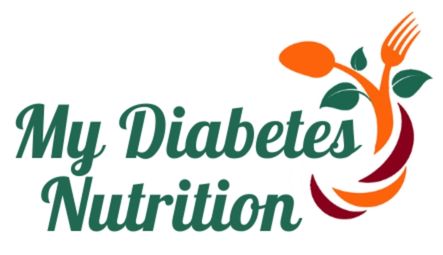
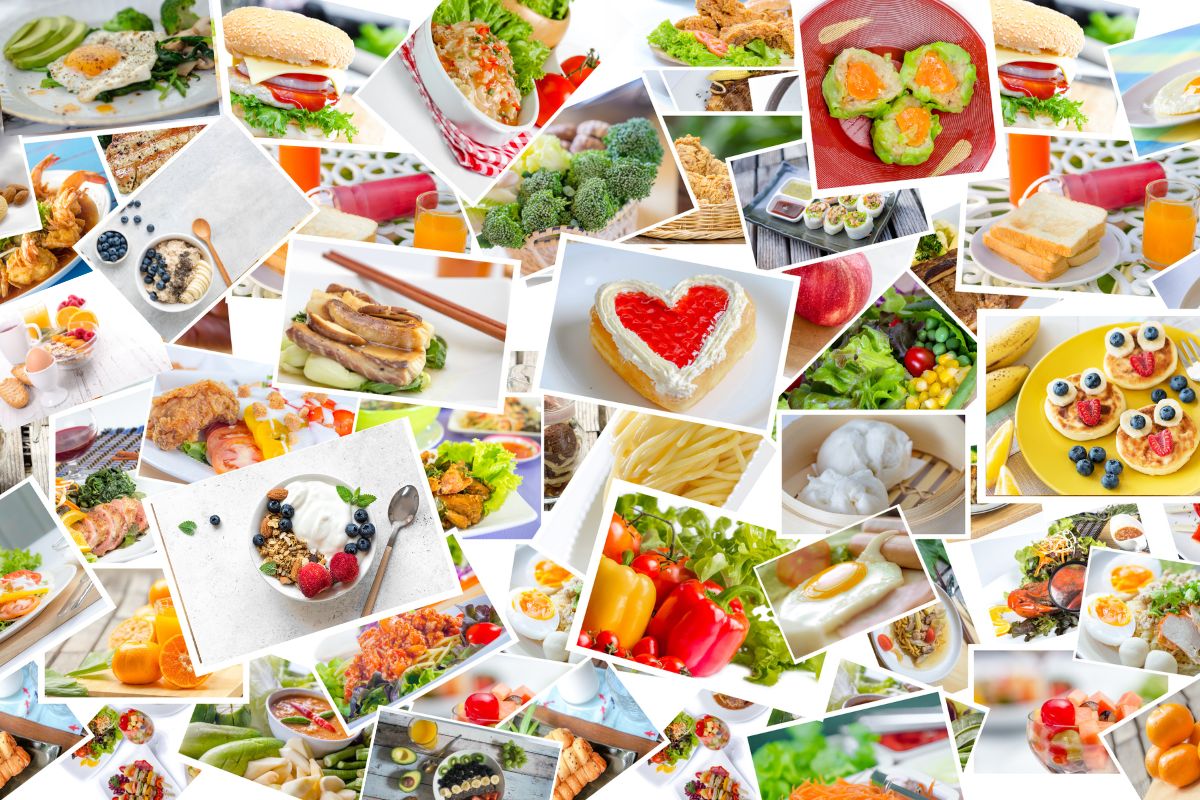

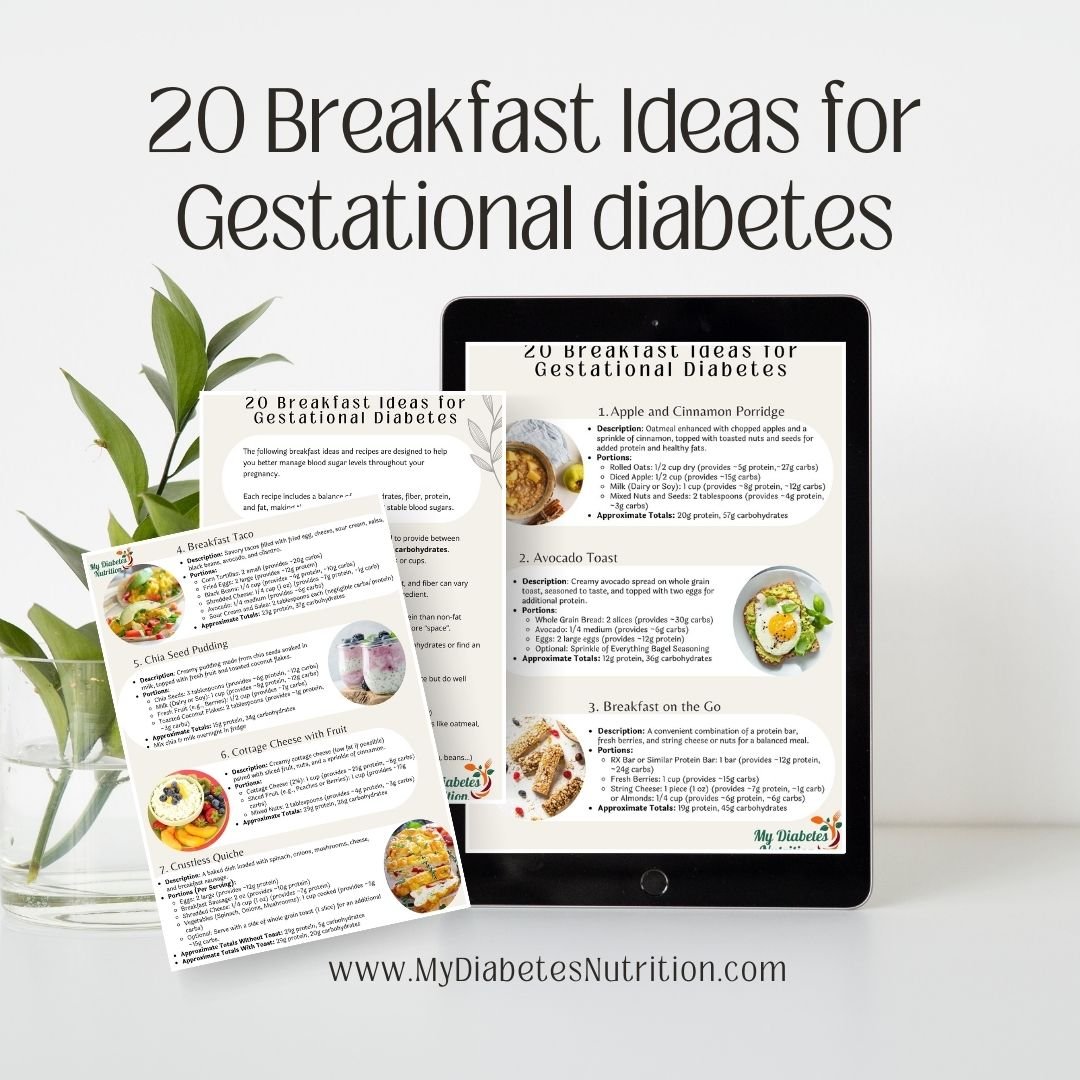
 “As a mom, business owner, wife… I. Get. It!! It is so hard to do it all! To find motivation, time, and support. To know how much, when, and how… To even think of yourself first.
“As a mom, business owner, wife… I. Get. It!! It is so hard to do it all! To find motivation, time, and support. To know how much, when, and how… To even think of yourself first.

